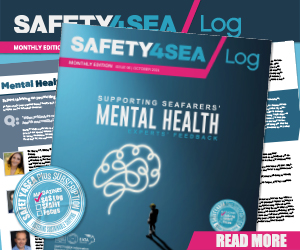In an exclusive interview to SAFETY4SEA, Olga Stavropoulou, Director General of the Hellenic Marine Environment Protection Association (HELMEPA), emphasizes that sustainable development is the global vision, and ESG serves as the tool to achieve it.
While the vision of sustainability is compelling, it requires structure to become operational and practical. ESG provides this structure by translating the vision into actionable business steps and enabling progress tracking through data and metrics. Stavropoulou also discusses HELMEPA’s efforts to foster a culture focused on environmental stewardship, social responsibility, and robust governance. She highlights key initiatives the organization has undertaken to promote sustainability excellence within the maritime industry.
SAFETY4EA: What is HELMEPA’s philosophy for the industry’s green transition and what are the top priorities on your agenda for the next five years?
Olga Stavropoulou: Our philosophy is that the green transition truly starts and must be led by people— conscious people with a green mindset one that’s not driven solely by regulations but by a genuine understanding of the need for change. And our top priority for the next years is for HELMEPA, to remain relevant, means staying in sync with people, being adaptable and proactive in foreseeing changes, and preparing others for those transitions. Since HELMEPA’s inception, we have been cultivating this eco-consciousness for our beloved blue planet. This mindset is deeply connected with empowering maritime professionals—seafarers, shipowners, office personnel, port workers—to lead with a proactive and sustainable approach. Of course, our commitment extends to society at large, for example we commit to raising climate change awareness among 2 million people over the next three years, as part of our broader efforts.
S4S: What role does collaboration play in your efforts to drive sustainability within the maritime industry?
O. St.: As the green transition revolves around empowering people and fostering sustainable development, we take every action, now and in the crucial years ahead, to provide seafarers, maritime professionals, and stakeholders with real-time access to the knowledge, tools, and best practices they need to navigate this transition. And we do so not alone, but with the valuable help of our members. We have reached 354 member companies and more than 14,000 individual seafarers and maritime professionals, forming a unique community like no other in the world, where sharing is a natural characteristic. On top of that, sustainability functions as a natural reflex in everything we do.
S4S: Can you discuss any recent developments or advancements of your organization that have particularly impacted the maritime industry?
O. St.: The HELMEPA Academy is one of the key platforms leading the green transition—an open, participatory knowledge-sharing hub that offers cutting-edge training in essential areas like pollution prevention, safety at sea, seafarer well-being, soft skills, ESG, and the UN’s Sustainable Development Goals (SDGs). So far, we have trained over 34,000 shipping and maritime professionals globally, and our goal is to reach even more, including the growing number of international crews that have joined in recent years. This is even more so the case in the context of decarbonization, where more than 800,000 seafarers globally will have to be trained, reskilled or upskilled on new and transitional fuels. Likewise, we are advancing major projects such as METAVASEA, promoting a people-centred approach for maritime decarbonization in the East Mediterranean, She4Sea for gender diversity, and eSgEA for promoting sustainability in shipping. By working closely and collaboratively with international stakeholders, such as IMO and WMU, the US Coast Guard and the Australian Maritime Safety Authority, as well as regional and local actors, we create valuable synergies to tackle critical issues such as decarbonization, safety, and the digital transformation of the industry. We believe in sincere partnerships—focused on synergetic growth, without the fear of competition.
S4S: How does HELMEPA focus on fostering a global culture of environmental responsibility within the maritime industry?
O. St.: Everything we do is anchored in the powerful spirit of volunteerism, which drives transformation through active engagement and a cultivated mindset. Volunteerism isn’t just one of our core values; it’s a skill we teach, develop, and nurture from a young age. This skill turns into inspired action that creates real impact. In fact, HELMEPA has inspired the creation of sister organizations in countries such as Cyprus, the U.S.A, Turkey, Australia, the Philippines, Uruguay, Ukraine and, most recently, Nigeria. These associations, under the International Marine Environment Protection Association (INTERMEPA), form part of a global network headquartered in Athens, united in our mission to protect the seas. When HELMEPA was founded in 1982 by Greek shipowners and seafarers through a Declaration of Voluntary Commitment “To Save the Seas,” it was built on the belief that a sustainable future is only possible if the human element is educated and proactive. That philosophy remains just as relevant today, over forty years later.
S4S: How can we create the right culture and mindset for an ESG-fit maritime industry?
O. St.: Sustainable development is the global vision, and ESG is the tool to get us there. While the vision of sustainability is powerful, it needs structure to be operational and practical. That’s where ESG comes in—it translates this vision into actionable business steps and helps track progress with data and metrics. It balances environmental impact, economic growth, and social responsibility, which is why integrating ESG into all aspects of business—from strategic planning to operations—is key to long-term growth. True sustainable development happens when environmental protection, economic prosperity, and social well-being all meet. For organizations to grow in the long term, they need to recognize that they are part of society, which in turn, is part of the global ecosystem. ESG helps us navigate this interconnected reality, ensuring responsible governance and minimizing negative impacts while maximizing positive outcomes. It tells our story to stakeholders—investors, employees, customers, and communities.
S4S: How does HELMEPA integrate ESG principles into its initiatives to support sustainable progress within the maritime industry?
O. St.: At HELMEPA, building an ESG-fit maritime industry means cultivating a culture that prioritizes environmental care, social responsibility, and strong governance. This culture is rooted in education, training, and collaboration, aligned with the needs of the industry and society at large. We go beyond regulations, recognizing the interconnectedness of people, businesses, and communities. By empowering maritime professionals with the skills to navigate both green and digital transitions, and by fostering youth engagement, we set the foundation for a sustainable future. To this end, strong partnerships and collaboration are essential, allowing us to share knowledge, learn from others, and drive collective progress. Our initiatives, from the office to the vessel, the classroom to the field, from training professionals to mobilizing volunteers, demonstrate how we foster an ESG mindset in every aspect of our work. With consistency, proactiveness, and relevance, we closely follow changes, challenges, and evolving needs, ensuring that we respond, not react, to drive sustainable progress in the maritime industry.
S4S: If you could change one thing across the industry from your perspective, what would it be and why?
O. St.: I would make sure that everyone, across all roles, departments, and levels—whether frontline staff or leadership—comprehends the value of shifting from reactive compliance to genuine responsibility. The real transformation comes when sustainability becomes an internalized value, not just a compliance checkbox. And I would accelerate this process because time matters, and the challenges and changes we face are both big and rapid. The good thing is that the industry has reflexes, is pioneering, and adaptable, and its stakeholders, together with HELMEPA, are actively embedding this mindset—leaving no one behind—that prioritizes the well-being of the environment, society, and the industry’s future.
S4S: What is your key message to industry stakeholders to foster a more sustainable future for shipping?
O. St.: We have made significant progress—our industry cares, listens, learns, and takes positive action. Open communication, top-down and bottom-up, is crucial to truly understanding the challenges, resistance, and potential within this green transition. Active listening to every voice in the industry, from seafarers to leadership, is key to identifying opportunities and overcoming obstacles. The industry is committed to moving forward—this is how we lead, leaving no one behind.
The views presented are only those of the authors and do not necessarily reflect those of SAFETY4SEA and are for information sharing and discussion purposes only.


































































